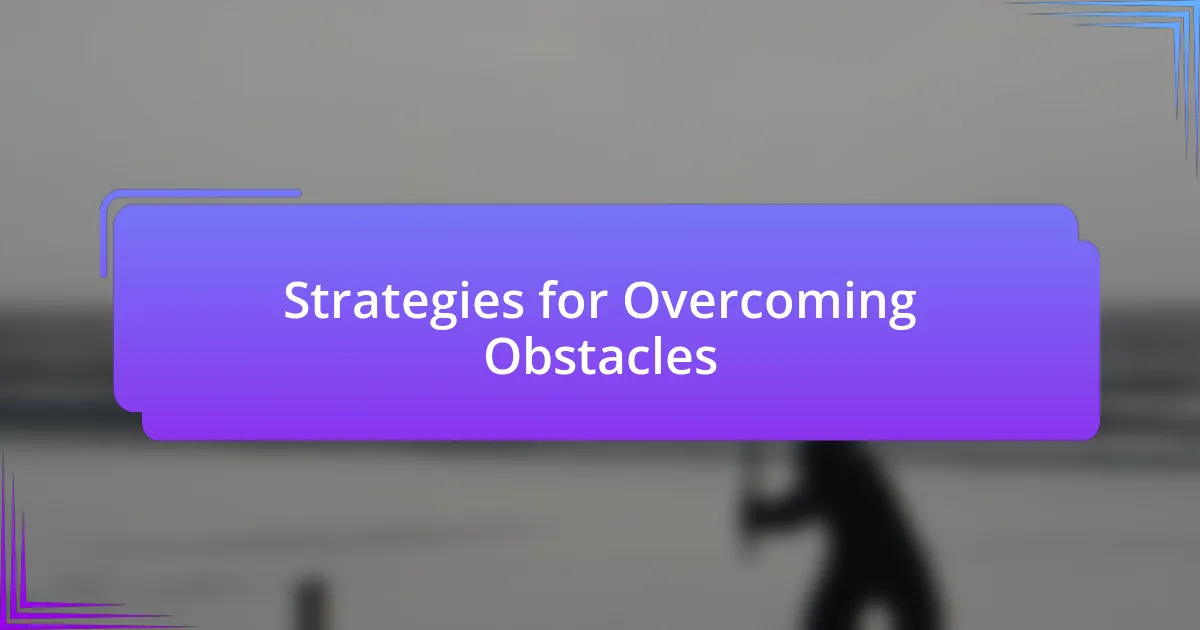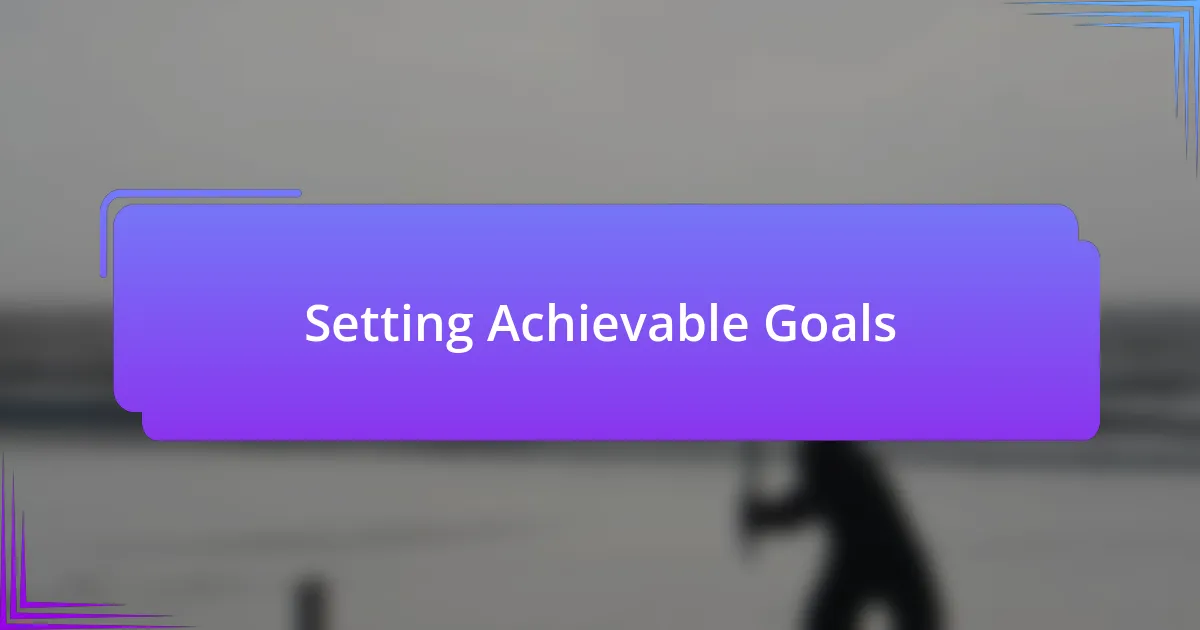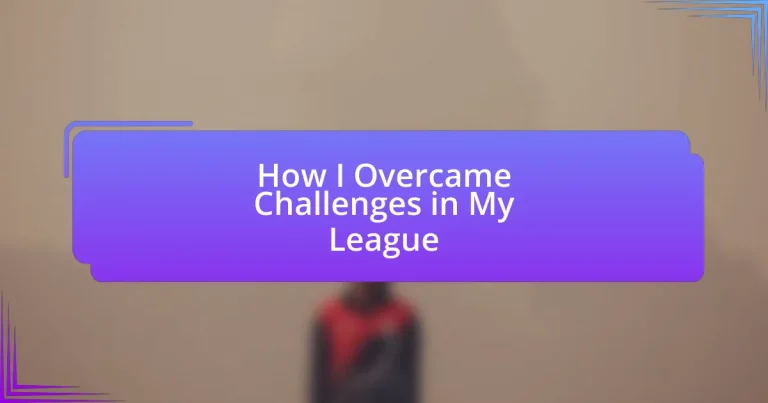Key takeaways:
- Overcoming self-doubt and injuries through mental strategies and support from teammates was essential for building resilience.
- Setting realistic and achievable goals helped transform challenges into tangible progress and motivation.
- Developing a positive mindset through affirmations, visualization, and journaling fostered confidence and a focus on growth from setbacks.
- Celebrating small victories reinforced belief in one’s abilities and maintained motivation throughout the journey.

Understanding the Challenges I Faced
One of the most significant challenges I faced in my league was the initial self-doubt that crept in before competitions. I vividly remember standing on the sidelines, my heart racing, questioning if I truly belonged there. Was I good enough? These thoughts clouded my mind, making it difficult to focus and perform at my best.
In addition to mental hurdles, physical setbacks played a huge role in shaping my experience. After a particularly taxing training session, I suffered an injury that sidelined me for weeks. It felt devastating, as if I had lost a part of my identity. I often asked myself how I would come back from this setback stronger than before.
Balancing my time between practice, personal life, and other commitments was another struggle. Juggling these responsibilities sometimes left me feeling overwhelmed. Have you ever felt stretched too thin? I did, and it became crucial for me to find effective coping strategies to manage my time and energy more wisely, or I risked losing my passion for the game altogether.

Strategies for Overcoming Obstacles
One of the most effective strategies I employed was developing a strong support network. Surrounding myself with teammates who understood my struggles and shared similar experiences made a world of difference. I distinctly recall confiding in a fellow player during a particularly tough training week. Together, we crafted a plan to tackle our mental blocks. It was encouraging to realize that we weren’t alone, and we held each other accountable on our journeys.
Another key strategy involved setting realistic goals. Instead of aiming for perfection, I focused on incremental progress. I jotted down specific, achievable objectives each week, which helped me stay motivated. Here’s how I broke it down:
- Set short-term and long-term goals
- Celebrate small victories, no matter how minor
- Reflect weekly on progress and adjust as needed
- Stay adaptable; focus on the process rather than just the outcome
By implementing these strategies, I was able to transform my obstacles into stepping stones, gradually building my confidence and resilience in the league.

Developing a Positive Mindset
Developing a positive mindset has been crucial for my journey in overcoming challenges. I remember a particularly difficult season where injuries plagued my team. Instead of dwelling on the setbacks, I consciously chose to focus on what I could control—my mindset. I began each day with affirmations, reminding myself of my strengths and capabilities. This small shift in perspective helped me to approach each practice with renewed enthusiasm and hope.
As I navigated the ups and downs of competition, I discovered the power of visualization. Before games, I would close my eyes and picture myself succeeding, feeling the rush of adrenaline as I made that perfect play. This technique didn’t just boost my confidence; it allowed me to embody the mindset of a successful athlete. There was a match where I vividly imagined a game-winning scenario, and when I found myself in that moment, I executed it flawlessly. It was incredibly empowering to see the results of my mental preparation come to life.
The journey toward cultivating a positive mindset is ongoing. I try to remind myself that setbacks are merely setups for comebacks. Whenever doubt creeps in, I take a moment to reflect and recalibrate. I often journal about my feelings and track my progress. This practice not only clarifies my thoughts but reinforces my belief that growth often stems from adversity, and each challenge is an opportunity in disguise.
| Strategy | Description |
|---|---|
| Affirmations | Daily reminders of strengths to build confidence. |
| Visualization | Mental picturing of success to prepare for competition. |
| Journaling | Reflecting on feelings and progress to reinforce a positive outlook. |

Building a Support Network
Building a support network has been a game changer in overcoming challenges within my league. I remember when I felt isolated during a tough season; I decided to reach out to my teammates instead of shutting them out. It was amazing how a simple conversation or gathering after practice could lift my spirits. This sense of camaraderie reminded me that we were all in it together, and leaning on one another was not a sign of weakness, but a strength.
One particular instance stands out to me: during an intense training camp, we formed a small support circle where we openly shared our struggles and triumphs. I found myself encouraging others while they lifted me up at the same time. It’s incredible how expressing our vulnerabilities creates an unbreakable bond. Have you ever experienced that feeling where sharing your burden makes it feel lighter? That’s exactly what our group did—transforming our challenges into collective motivation.
In addition to my teammates, I sought guidance from coaches and mentors who had been through similar experiences. Their insights provided invaluable perspectives on resilience and growth. I recall a conversation with my coach after a particularly challenging match. He reminded me that every setback is a stepping stone, and his belief in my abilities reinforced my determination. By surrounding myself with a mix of support from peers and mentors, I learned that we’re never truly alone in our struggles; it’s all about finding the right people to lift us up.

Learning from Setbacks
There was a time when I faced a significant setback—a championship game that we lost by a narrow margin. In the aftermath, I found myself questioning not just my skills, but the effort I had put in throughout the season. Instead of wallowing in disappointment, I decided to analyze what went wrong, honing in on specific moments where I could have made different choices. This self-reflection transformed my sorrow into a roadmap for growth. Have you ever turned a painful experience into a lesson learned? It’s a powerful shift that helped me focus on improvement.
Another memorable setback came during a crucial training session when I struggled to keep up with my peers. Instead of dismissing the experience, I took a step back and reassessed my training methods. I reached out to others who seemed to excel effortlessly, asking about their routines and strategies. This openness not only broadened my understanding of what was effective but also deepened friendships as we navigated our challenges together. I realized that sometimes setbacks are invitations to seek knowledge and build connections. Could this be the moment to learn something new?
Reflecting on these experiences, I’ve come to appreciate that setbacks aren’t the end of the line; they are integral to our journey. I often remind myself that growth springs from discomfort. It can be disheartening, I know, but embracing those tough moments has reshaped my perspective, allowing me to emerge stronger each time. When I face a hurdle, I now ask myself: what can I learn here? This simple question has shifted my mindset from defeat to opportunity.

Setting Achievable Goals
Setting achievable goals is essential for turning challenges into victories. Early in my journey, I often set lofty objectives that felt more like distant dreams than attainable milestones. It was during one competitive season that I decided to break my goals into smaller, manageable pieces, like aiming to improve my scoring average by just one point each month. This approach transformed my outlook, making progress feel tangible and rewarding.
One time, I targeted a specific technique to enhance my performance. Rather than attempting to overhaul my entire game in one go, I focused solely on one aspect—my endurance. By setting a weekly goal of adding ten extra minutes to my running sessions, I gradually built my stamina. The small victories along the way not only bolstered my confidence but also kept me engaged in the process. Have you ever noticed how celebrating small wins can fuel your motivation?
I’ve learned that the key to setting achievable goals lies in balancing ambition with realism. As I reflected on my progress, I found that sharing my goals with teammates created a support system that encouraged accountability. This collaboration helped me stay focused and inspired, making the journey not just about individual success but a collective effort. What goals have you set that require a little teamwork to achieve?

Celebrating Small Victories
Small victories are often overlooked, yet they hold immense power. I remember a time when I simply wanted to execute a flawless pass during practice. The day I managed to deliver that perfect pass, I couldn’t help but celebrate it. It felt exhilarating, as if I’d conquered a mountain. Each time I achieved such small successes, they added a layer of motivation that reinforced my belief in my abilities.
Sometimes, I would take a moment to reflect after a session that highlighted my improvements. Even nailing a complicated drill felt monumental, and I often gave myself a mental high-five for it. I learned to jot down these moments in a journal, creating a visual reminder of my growth. Looking back and reading those entries always sparks joy and pride in my progress. Have you ever kept track of your small victories? It can be a game-changer.
During one particularly challenging tournament, I focused on celebrating minor achievements, like successfully executing a strategy we had practiced. Even if our team didn’t win, knowing I had played my part to the best of my ability made the experience worthwhile. Each small win contributed to a sense of ongoing improvement, turning what could have been disappointment into motivation for the next challenge. Isn’t it fascinating how these little moments can shift our perspective completely?














